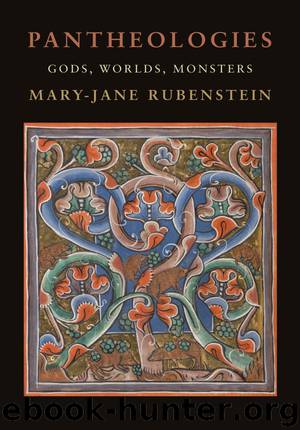Pantheologies by Rubenstein Mary-Jane.;

Author:Rubenstein, Mary-Jane.;
Language: eng
Format: epub
Tags: REL051000, Religion/Philosophy, PHI022000, Philosophy/Religious
Publisher: Lightning Source Inc. (Tier 3)
Published: 2018-11-06T00:00:00+00:00
4
THEOS
All things are full of gods.
—Thales of Miletus
Dear God. Dear Stars, dear trees, dear sky, dear peoples.
Dear everything. Dear God.
—Alice Walker, The Color Purple
FINALLY
In the face of pantheism’s perennial philo-theological denigration, the study at hand has undertaken both a diagnosis of this widespread panic and a conceptual reconstruction of the offending term. Attributing the vitriolic name-calling that so often attends “pantheism” to a fear of crossed boundaries and queer mixtures, we have sought to cobble together the sort of position that might actually perform the thoroughgoing disruptions that anti-pantheists fear. Responding in particular to the charges of pantheist indistinction, passivity, and givenness, the last three chapters have unearthed a ceaselessly multiple, destructive-creative, animate materiality that both produces and emerges from “all things” in their various worldings and re-worldings. The remaining question, then, is what it might mean to call such monstrous operations theological. What does it do to the categories of divinity, the gods, or even “God” to identify them with such polycosmic sympoiesis? And reciprocally, what does it add to the polycosmically sympoietic to call it divine?1 Addressing these questions will force us to revisit the problem of determinism we first glimpsed in Spinoza and then, finally, to confront the remaining challenges to pantheism as it is usually construed: namely, its alleged moral relativism (or sanctioning of “evil”), and its equivalence to atheism. If “God” is nothing other than “the world,” then why would anyone bother to act responsibly, to make worlds otherwise, or in fact to appeal to divinity at all?
At this point, one might be tempted to take refuge in either of the admittedly more straightforward positions of theism and atheism, appealing either to the transformational covenant of an extra-cosmic deity or to the awesome and awful unfoldings of “strictly” biological processes. Conceptually, ethically, and for the sake of minimizing cognitive dissonance, one would certainly be justified in taking one or the other of these stances. It has been the wager of this particular exploration, however, that it is precisely pantheism’s unthinkability that calls for thinking. Less dramatically stated, pantheism’s promise lies in its discomfiting refusal of those traditional Western metaphysical divisions of theism and atheism, God and world, spirit and matter, and indeed science and religion—divisions that manage, regardless of the camp one chooses, consistently to privilege light over darkness, male over female, and a carefully circumscribed “humanity” over everything else.
Of course, not all pantheisms will unsettle such privileges. As we have seen, monistic schemes tend to consolidate the dualistic inequalities they purportedly reject by gathering the whole world into one side or another of the binary in question. By proclaiming absolute unity, they moreover assemble “all things” under “progressive” categories of race and species, often marshaling evolutionary theory to produce a strikingly familiar Great Chain of Being. In this way, monistic pantheisms deny all qualitative difference only to solidify quantitative difference, reaffirming European-descended male humans as the pinnacle of creation. What we have therefore sought instead are Jamesian “pluralist” pantheisms—those provisionally named “pantheologies”—that attribute divinity
Download
This site does not store any files on its server. We only index and link to content provided by other sites. Please contact the content providers to delete copyright contents if any and email us, we'll remove relevant links or contents immediately.
The Lost Art of Listening by Michael P. Nichols(7159)
Why I Am Not A Calvinist by Dr. Peter S. Ruckman(4045)
The Rosicrucians by Christopher McIntosh(3371)
Wicca: a guide for the solitary practitioner by Scott Cunningham(3040)
Signature in the Cell: DNA and the Evidence for Intelligent Design by Stephen C. Meyer(2875)
Real Sex by Lauren F. Winner(2861)
The Holy Spirit by Billy Graham(2775)
To Light a Sacred Flame by Silver RavenWolf(2674)
The End of Faith by Sam Harris(2629)
The Gnostic Gospels by Pagels Elaine(2393)
Waking Up by Sam Harris(2329)
Nine Parts of Desire by Geraldine Brooks(2279)
Jesus by Paul Johnson(2224)
Devil, The by Almond Philip C(2202)
Heavens on Earth by Michael Shermer(2185)
The God delusion by Richard Dawkins(2182)
Kundalini by Gopi Krishna(2089)
Chosen by God by R. C. Sproul(2053)
The Nature of Consciousness by Rupert Spira(1976)
